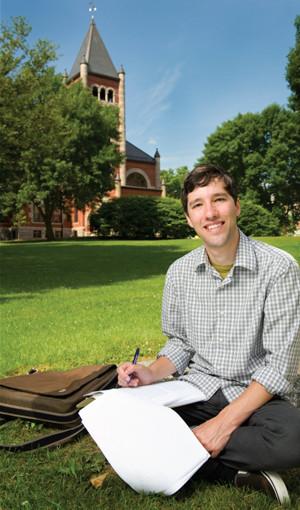Excellence in Teaching, 2010
Psychology

Good teaching can be like good psychotherapy: establish an environment in which students feel comfortable testing their limits; then, in time, challenge them to grow even more. For Bobby Eckstein, lecturer in psychology and justice studies, this isn’t an abstract analogy. He is trained as a psychologist, and the skills he’s developed as a clinician have proven very effective in the classroom. Students rave about his teaching, with dozens describing him as “the best teacher I have ever had.”
Yet Eckstein fell into teaching—and UNH—somewhat by accident. A computer match placed him at the UNH Counseling Center for his clinical internship. When the psychology department needed a last-minute teaching replacement, a colleague suggested Eckstein. He was offered the job and thought he’d give it a try. One class led to six; one year to seven. “I learned that I liked teaching even more than I thought I was going to,” Eckstein says. “I really love it here.”
In his courses—which include introduction to psychology, forensic psychology, personality, and counseling—Eckstein credits the influence of psychologist Carl Rogers, who had the revolutionary idea that therapists should be kind to their clients. “At the beginning, I let students know that I’m not going to be judging them and I’m not there to criticize them,” says Eckstein. Later in the semester, he ups the ante. “Then,” says Eckstein, “when someone gives an answer in class that’s really close but not quite right, I push them to think a little harder. They know I’m not trying to embarrass them. It is about establishing trust early on so that they can do some of the heavy lifting that’s required.”
Central to Eckstein’s philosophy is the belief that teachers should not “shy away from the personal and the interpersonal.” Being open encourages students to be open, which, in turn, can create a personal connection to the material: “I’m talking about theory, I’m talking about research. But these ideas are also very real. They have a real effect on us.” Eckstein points out with a smile that psychology is, after all, the study of us.
—Susan Dumais
About this Award
Each year, the University selects a small number of its outstanding faculty for special recognition of their achievements in teaching, scholarship, and service. Awards for Excellence in Teaching are given in each college and school, and University-wide awards recognize public service, research, teaching, and engagement.
